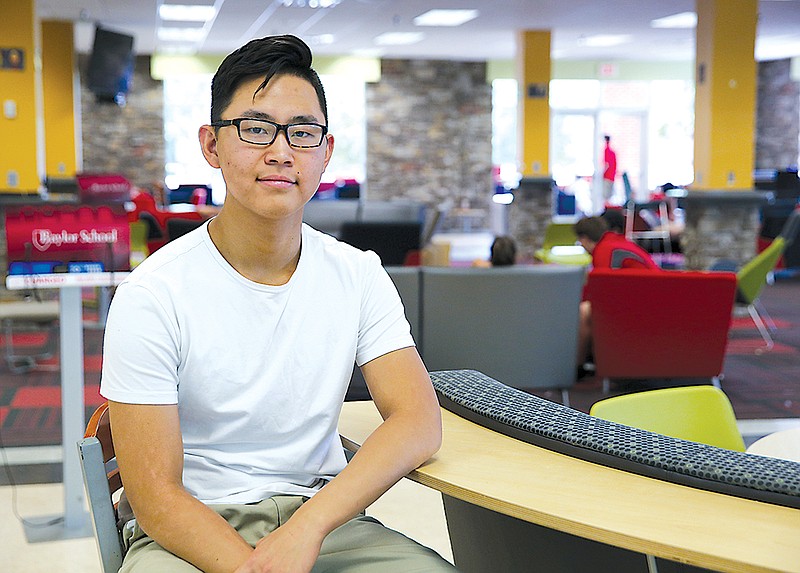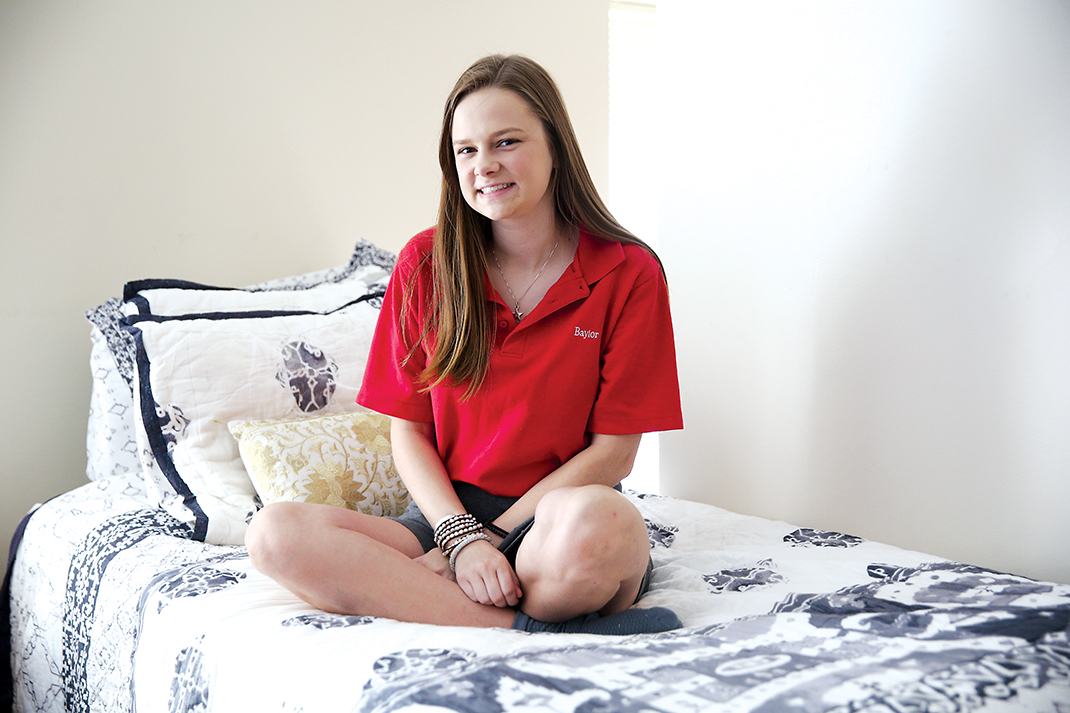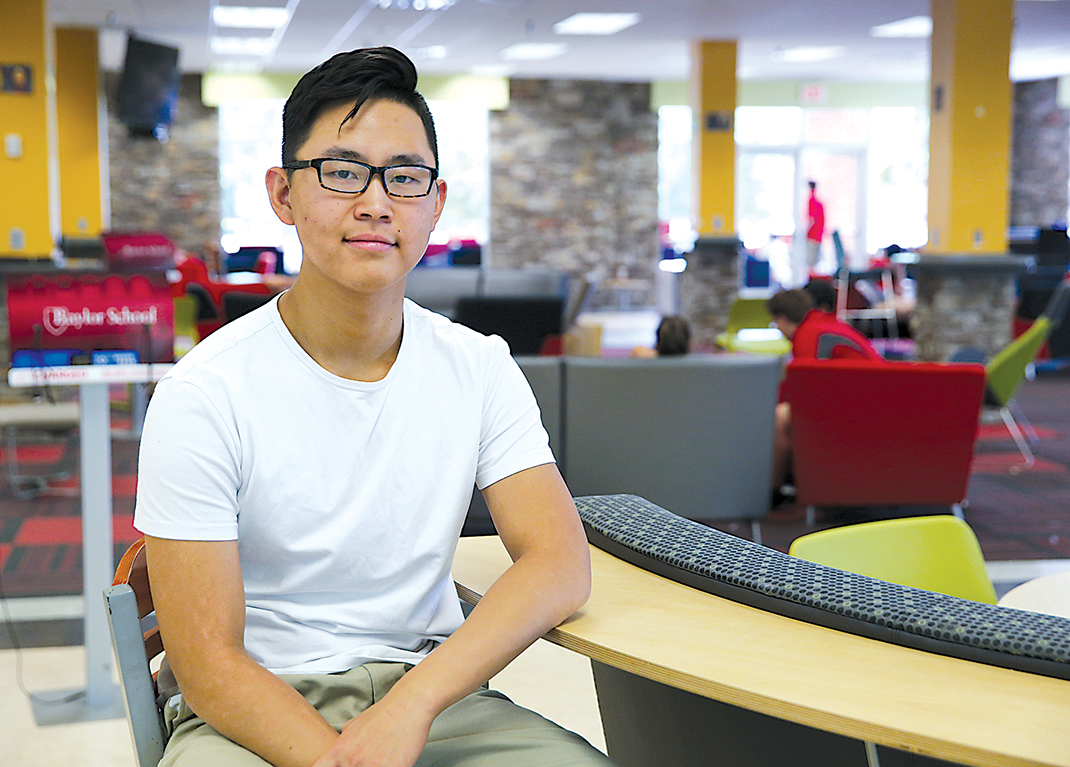Julia Steck
Age: 17Hometown: Atlanta, GeorgiaOccupation: Student
Patric Song
Age: 17Hometown: Shenzhen, ChinaOccupation: Student
While sending kids away to boarding school isn't as common these days as it was historically, Jim Kennedy, director of admissions at Baylor School, says the practice still carries major educational benefits.
Each year, the co-ed college prep school hosts around 200 high school boarders from across the country and the globe. Their parents haven't sent them because they are troublemakers in need of discipline, he explains; they've sent them because they want to give their children the best shot at independence.
While learning to manage their time - and their laundry - these boarders learn resilience and grit that give them a head start when they make the transition to college, Kennedy says. Among the many students who illustrate that growth are incoming seniors Julia Steck and Patric Song, who both began their journey at Baylor at age 14.
Julia Steck: My mom went to a boarding school growing up and talked about it a lot, so I was kind of familiar with the concept. I looked at one other boarding school but Baylor just kind of caught my eye, and after one visit, my parents and I were convinced that it was where I was meant to be.
Patric Song: I went to a boarding school here [in China] for middle school, but I really didn't fit into the environment. I was looking at all the boarding programs in the States, and a friend said Baylor had a really good program. I checked it out and I really liked it but I hadn't been to the States before I went to Baylor, so I kind of thought that America was kind of the same everywhere. [laughs]
JS: Going into Baylor, I was really nervous because there's so many more day-students than boarding students. I was really concerned that we were just going to be "the boarders." But everyone's just so excited you're there and wants you to be part of the community. Within my second week I was already spending the night out at a day-student's home, which was something I didn't really expect to have going into boarding school.
PS: When I first got there people were like, "Come sit with us at lunch." They welcome you to be a part of their circle. But being a boarder, you always feel like an outsider so we do a lot of stuff together as a dorm. It's really like this strong sense of community and it makes you feel really welcome.
JS: Right before I left for school my parents taught me some basics, like how to work a washing machine, but that was about it. I had to figure things out by myself. There was no one to tell me when to start my homework; no mom saying "Come on, let's go have dinner." It was up to me to ask questions of my teachers and of my peers.
JS: I had to gain some new problem solving skills. Eventually, I just gained a new level of self-confidence knowing I can handle certain situations. So when I cracked my windshield while driving to Chattanooga in the winter, I had already taken it to a shop and figured everything out before I even told my parents.
PS: Compared to middle school, the boarding program at Baylor gave you more freedom. That's when I really learned to organize my own time schedule and learn how to deal with roommate problems and think about small things like "what time do you want to wake up?" That's when I started actually taking responsibility for my daily life, because there was nobody there who tells you what to do.
PS: In my middle school [in China], it was well, I don't want to use the word "prison" but it was really strict. You wake up at 6 a.m., have lights out at 10 p.m. You don't have any free time in the dorm, and you have someone on every floor making sure you're on schedule.
PS: When I first got to Baylor, I was kind of overwhelmed with all the choices. I remember my grades dropped at one point, and that's when I realized I had to make a schedule and take more responsibility.
JS: I think [my academic performance is] better because of those bad experiences. It's from the experiences when I forgot to do my homework or when I failed the test because I didn't study as much as I probably should have that made me a better student. I learned from those experiences and did better next time.
PS: One of the big things I had to change was how I deal with other people. I roomed with three people [in middle school] but we didn't really spend time in the dorm, so I never really had a roommate that you lived with for two years.
JS: When you live with someone, you learn the good and the bad about them. You start out wanting to be best friends with them, but it's really frustrating when someone doesn't agree with you, especially when you have to sleep five feet away from them when you're just so mad at them. [laughs]
PS: My freshman roommate and I were pretty different, but neither of us were really talkative so we didn't really communicate about our issues. By the end of the year, it was really bad. We didn't even talk to each other for a month. I had to learn to be more mature and open and say what I want and what I think.
PS: I also used to be really scared to talk to my parents about any issues I was facing. This being a traditional Asian household, people don't really talk about any real issues. But after learning to speak my mind, I felt more confident, and I started talking to them about my experiences and emotions.
JS: I definitely think my relationship with my parents has become more meaningful. Before, my mom had a lot more access to my teachers, my grades and my homework, so my parents could be more on top of me. Now, they don't know all the intimate details, but trust me to handle it on my own and tell them if I've done poorly in a class or when I had a rough day. So it's more of an adult relationship. It's not my mom saying "You shouldn't do that because it's bad," but more me calling her for counseling and advice.
JS: Overall, boarding just challenged me and really prepared me for the future, because in life, you have to do things for yourself. That's how you become an adult. And for me to gain those skills in high school, it's just going to take me so much farther in college and beyond.
PS: I wouldn't trade my experience as a boarder for anything. Well [laughs] maybe some of it.


